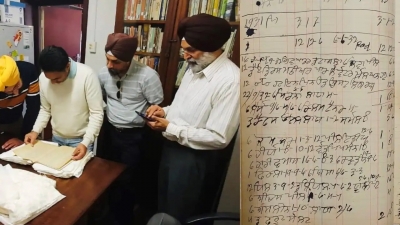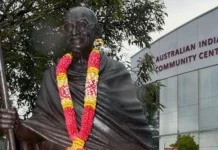CANBERRA: In Dongara, some 351 km northwest of Perth, more than a century-old leather-bound book containing entries written in Gurmukhi – the official script of the Punjabi language – has been found.
The discovery was confirmed by Tarun Preet Singh of the Sikh Association of Western Australia (SAWA), who went to Dongara in person to see the newly-discovered treasure, which offers rare insight into the largely forgotten Sikh community of Dongara, the SBS Punjabi reported.
Sikhs are known to have arrived in Australia in the mid-nineteenth century and found work as hawkers, cane cutters, and camel drivers. In the early part of the 20th century, they became active with the wrestling circuit all over Australia.
“The gurdwara in Canning Vale got an email that some old leather ledger with transactions written in Punjabi script had been found and that the Western Australia Museum wanted help with the translations,” Singh told SBS Punjabi. Singh, who is actively engaged in uncovering Sikh history in Australia, said that the ledger shows that even 100 years ago, Sikh settlers were established businessmen in Australia and carried out their day-to-day transactions in their own language.
He credited the discovery of the ledger to the Western Australia Museum’s search efforts to find old artifacts as a part of its expansion programme.
“Someone found it from the ashes… it didn’t get burnt due to their thickness,” Singh said.
The Geraldton and Dongara areas were booming regions for the pioneer Sikhs of Western Australia (belonging to the Indian ethnicity), including Sojan Singh, Pola Singh, Ruhr Singh, and Anzac Nain Singh Sailani, who all belonged to these regions.
Sojan Singh was one of the few early Punjabi settlers of Western Australia, who owned a store and even a holiday home in Donagara. The earliest recorded evidence of a Sikh being in Western Australia was Pal Singh who arrived in Perth in 1886. He was a camel owner and settled in Wyndham, according to SAWA.
Now, the Sikhs form one of the largest subgroups of Indian Australians with 210,000 adherents according to the 2021 census, having grown from 12,000 in 1996, 17,000 in 2001, 26,500 in 2006, and 72,000 in 2011.
Also Read: India, Australia to deepen bilateral relations in education, skilling, research







